
Watercraft
Cutters
Originally, the Coast Guard used the term cutter in its traditional sense, as a type of small sailing ship.[1]
Larger cutters, over 181 feet (55 m) in length, are controlled by Area Commands, the Atlantic Area or Pacific Area. Smaller cutters come under control of district commands. Cutters usually carry a motor surf boat and/or a rigid-hulled inflatable boat. Polar-class icebreakers (WAGB) carry an Arctic survey boat (ASB) and landing craft.
Any Coast Guard crew with officers or petty officers assigned has law-enforcement authority (14 USC Sec. 89) and can conduct armed boardings.
The Coast Guard operates 243 Cutters,[2] defined as any vessel more than 65 feet (20 m) long, that has a permanently assigned crew and accommodations for the extended support of that crew.[3]
| Name or Class | Image | Quantity | Length | Armament | Notes |
|---|---|---|---|---|---|
| Polar-class 2 | 0 | 460' |
|
Building 2, 3 total on order. The Polar Security Cutter Program is to replace the Polar-class. To enter service in 2025. | |
| Healy-class | _north_of_Alaska.jpg.webp) |
1 | 420' |
|
Medium class icebreaker used for icebreaking and research. Entered service in 2000.[5] |
| Legend-class | .jpeg.webp) |
9 | 418' |
|
9 Active; Building 2; Option for 12th.[6] Designated to replace the Hamilton-class. Entered Service in 2008. |
| Polar-class |  |
1 | 399' |
|
USCGC Polar Star (WAGB-10) is only active heavy icebreaker. Entered service in 1976.[7][8][9] USCGC Polar Sea (WAGB-11) is located in Seattle, Washington but is not currently in active service. |
| Heritage-class | 0 | 360' |
|
3 under construction; 12 ordered or optioned; 25 total planned.[10] Designated to replace the Famous-class and Reliance-class. To enter service in 2025.[11] | |
| USCGC Eagle | 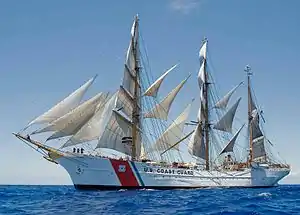 |
1 | 295' | None | USCGC Eagle (WIX-327): Eagle is home ported at the Coast Guard Academy in New London, Connecticut. It is used for training voyages for Coast Guard Academy cadets and Coast Guard officer candidates. USCGC Eagle was built in Germany as the Horst Wessel, and was taken by the United States as a war reparation in 1945. |
| USCGC Alex Haley | 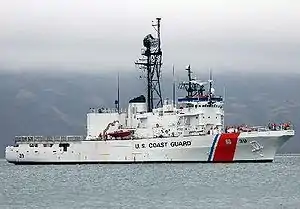 |
1 | 283' |
|
Entered service in 1971 as USS Edenton. |
| Famous-class | 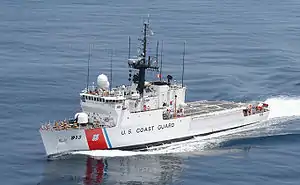 |
13 | 270' |
|
Entered service in 1983. |
| USCGC Mackinaw | 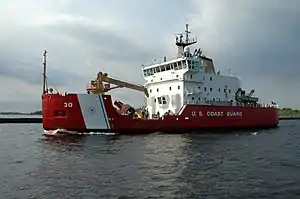 |
1 | 240' |
|
Mackinaw is a 240-foot (73 m) heavy icebreaker built for operations on the North American Great Lakes and home ported at Cheboygan, Michigan. Entered Service in 2006. |
| Juniper-class | _and_lighthouse.jpg.webp) |
16 | 225' |
|
Entered service in 1996. |
| Reliance-class | 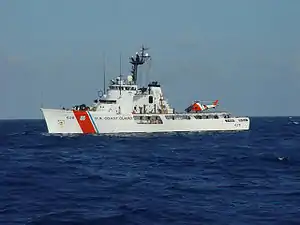 |
14 | 210' |
|
Entered service in 1964. |
| Keeper-class |  |
14 | 175' | None | Entered service in 1997. |
| 160-foot-class Inland construction Tender |  |
4 | 160' | None | Entered service in 1976. |
| Sentinel-class | 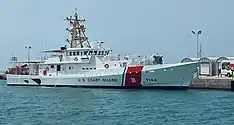 |
40 | 154' |
|
64 planned. Designated to replace Island-class. Entered service in 2012. |
| Bay-class | 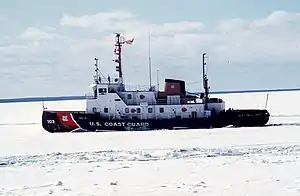 |
9 | 140' | 10 planned. Entered service in 1979. | |
| Island-class |  |
49 | 110' | (WPB): Eight additional 110-foot patrol boats were extended to 123 feet (37 m) but structural issues developed shortly after these conversions and the cutters were deemed unsafe to operate.[12] Entered service in 1985. | |
| 100-foot Class Inland Buoy Tenders |  |
2 | 100' | None | Entered service in 1945. |
| 100-foot-class Inland Construction Tender |  |
3 | 100' | None | Entered service in 1944. |
| Marine Protector-class | 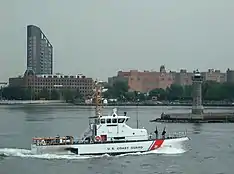 |
67 | 87' |
|
Entered service in 1998. Sea PROTECTOR MK50 GWS Carried on four Marine Protector Class Cutters. |
| Kankakee-class | 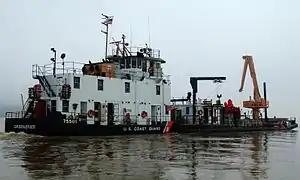 |
2 | 75' | None | Entered service in 1990. |
| Gasconade-Class |  |
9 | 75' |
|
Entered Service in 1964 |
| 75' inland construction tender | 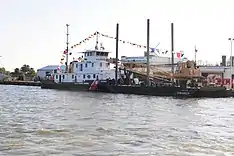 |
9 | 75' | None | Entered service in 1962 |
| 65' river buoy tender |  |
2 | 65' | None | |
| 65' inland buoy tender | _462.jpg.webp) |
2 | 65' | None | Entered service in 1954 |
| Small Harbor Tug | 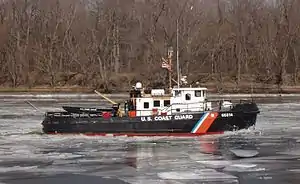 |
11 | 65' | None | (WYTL): This is a class of eleven 65-foot tugs used by the United States Coast Guard for search and rescue, law enforcement, aids-to-navigation work and light icebreaking. Entered service in 1961. |
Boats
The Coast Guard operates about 1,402 boats, defined as any vessel less than 65 feet (20 meters) in length, which generally operate near shore and on inland waterways. The most common is 25 feet (7.6 m) long, of which the Guard has more than 350.[13] The shortest is 13 feet (4.0 m).
.jpg.webp)
- The Coast Guard boat fleet includes
| Name | Image | Length | Notes |
|---|---|---|---|
| 64-ft Aids to Navigation Boat | 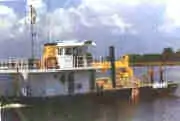 |
64' | |
| 64-ft Screening Vessel | 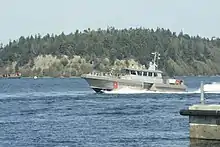 |
64' | |
| 55-ft Aids to Navigation Boat |  |
55' | |
| 52-ft Motor Life Boat | 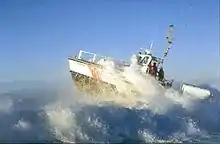 |
52' | The Coast Guard currently has four of the 52-foot motor life boats, a craft designed from the ground up to serve in challenging surf conditions. All four craft are currently assigned to surf stations in the Pacific Northwest. Also known as "Special Purpose Craft - Heavy Weather (SPC-HWX)" |
| Buoy Utility Stern Loading | 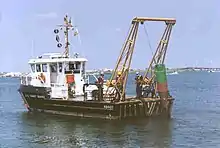 |
49' | |
| 47-ft Motor Life Boat | 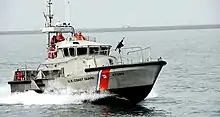 |
47' | The Coast Guard's 47-foot primary heavy-weather boat used for search and rescue as well as law enforcement and homeland security.[14] |
| Response Boat Medium | .jpg.webp) |
45' | The Coast Guard has signed a multi-year contract for 180 Response Boat – Medium (RB-M) boats that were delivered starting in 2008 to replace the 41′ UTB boats. These aluminum boats are 45 feet (14 m) in length, with twin diesel engines (total 825 hp), are self-righting, have a four crew, six passenger capacity, are equippable with two .50 caliber machine guns, have an excellent fendering system, can achieve a top speed of 42 knots (78 km/h), and are capable of towing a 100-ton vessel in eight-foot seas. The boats were built by Kvichak Marine Industries of Kent, Washington and Marinette Marine of Manitowoc, Wisconsin.[15][16] |
| Near-Shore Life Boat | 42' | ||
| 39-ft Tactical Training Boat | 39' | ||
| 38-ft Training Boat | 38' | ||
| Arctic Survey Boat | 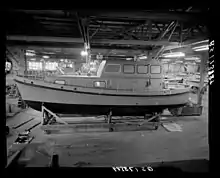 |
38' | Only one of these vessels is used by the Coast Guard. It is kept on the USCGC Healy and is used for arctic studies. |
| 36-ft Boarding Team Delivery | 36' | ||
| Long-Range Interceptor | 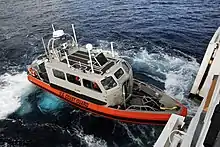 |
36' | An 11-meter (36-foot) high-speed launch that can be launched from the rear ramps of the National Security Cutters.[17] |
| 33-ft Law Enforcement | .jpg.webp) |
33' | |
| Trailerable Aids to Navigation Boat | 29' | ||
| Response Boat- Small II | 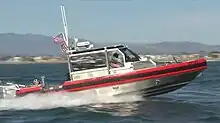 |
29' | A 29-foot replacement for the Defender Class, built by Metal Shark Boats. |
| Cutterboat- Over the Horizon | _boat.jpg.webp) |
25' | |
| Transportable Security Boat |  |
25' | 25-foot (7.6 m) boat, based on the commercial version of the 25-foot (8 m) center-console Boston Whaler, suitable for work in inland waters, easily transportable by trailer. These are primarily used by Port Security Units for force protection in naval support areas abroad, as well as, ports of embarkation/debarkation in expeditionary areas. Most recently these boats and units were deployed to Kuwait in support of Operation Iraqi Freedom. The durability, versatility, and mobility of these boats make them ideal for this type of operation.[18] |
| Response Boat- Small | 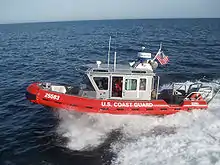 |
25' | A high-speed boat, for a variety of missions, including search and rescue, port security and law enforcement duties. The original 25-foot boats built by SAFE Boats International (Secure All-around Flotation Equipped) of Port Orchard, Washington are being replaced by 29-foot boats built by Metal Shark Boats of Jeanerette, LA.[19][20] |
| 24-ft Shallow Water | 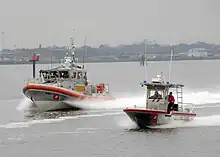 |
24' | |
| 24-ft Cutterboat - Aids to Navigation - Large | 23' | ||
| Cutterboat- Large | 24'-19' | ||
| 22-ft Airboat | 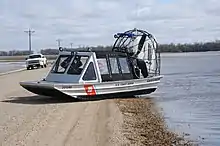 |
22' | |
| 20-ft Aids to Navigation Boat - Small | 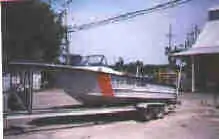 |
21' | |
| 20-ft Airboat | 20' | ||
| 18-ft Cutterboat - Aids to Navigation - Medium | 18' | ||
| 18-ft Airboat | 18' | ||
| Cutterboat- Medium | 17' | ||
| 16-ft Aids to Navigation Boat – Skiff | 16' | ||
| Cutterboat- Small | 13' | ||
- USCG Auxiliary
- Auxiliary Operational Facilities: The Coast Guard surface fleet is augmented by privately owned vessels operated by the United States Coast Guard Auxiliary.
Aircraft
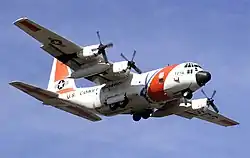
The Coast Guard operates about 210 aircraft. Fixed-wing aircraft, such as Lockheed HC-130 Hercules turboprops, operate from Air Stations on long-duration missions. Helicopters (Aérospatiale HH-65 Dolphin and Sikorsky HH-60J Jayhawk) operate from Air Stations, Air Facilities, and flight-deck equipped cutters, and can rescue people or intercept smuggling vessels. Some special MH- designated helicopters are armed with guns and some are equipped with armor to protect against small arms fire.
The Coast Guard flies several aircraft types:
| Name | Image | Quantity | Notes | |
|---|---|---|---|---|
| Lockheed HC-130 Hercules | 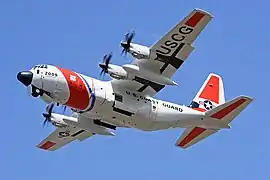 |
27 | ||
| HC-27J Spartan | .jpg.webp) |
11 | [21][22] Out of 14 on order. | |
| CASA HC-144A Ocean Sentry |  |
18 | [23][24][25] | |
| Gulfstream C-37A | .jpg.webp) |
2 | Aircraft as a VIP transport for high-ranking Coast Guard and Homeland Security officials.[26] | |
| HH-65 Dolphin |  |
102 | ||
| Sikorsky MH-60T Jayhawk |  |
42 | [27] | |
| RG-8A Condors | 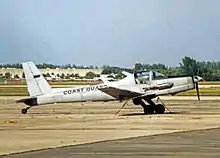 |
unspecified number | ||
| Boeing Insitu ScanEagle | .jpg.webp) |
unspecified number | [28] | |
The Coast Guard was to purchase the Bell Eagle Eye UAV as part of the Deepwater program, but this has been cancelled.[29] The Coast Guard is currently preparing to launch a small UAS competition for the Legend-class NSC and future Heritage-class cutter.[30]
In addition to regular Coast Guard aircraft, privately owned general aviation aircraft are used by Coast Guard Auxiliarists for patrols and search-and-rescue missions.

Land vehicles
| Name | Image | Origin | Quantity | Notes |
|---|---|---|---|---|
| MWV | ||||
| HMMWV | 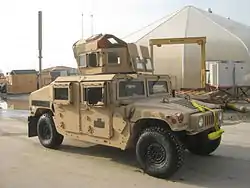 |
limited unspecified number | Used primarily by Deployable Specialized Forces[31] | |
| LSSV | 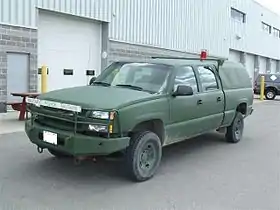 |
unspecified number | [32] | |
Electronic Warfare Systems
- Sea Commander Aegis derived combat system
- SCCS-Lite combat data system
- AN/SLQ-32B(V)2 Electronic Warfare System
- L-3 C4ISR suite
- AN/SPS-78 surface search and navigation radar
- AN/SPS-50 surface search radar
- AN/APX-123(V)1 IFF (ship automation provided by MTU Callosum)
Shipboard Weapon Systems
| Name | Image | Notes | ||
|---|---|---|---|---|
| M153 CROWS II |  |
Sea PROTECTOR MK50 GWS | ||
| Mk 38 25mm autocannon | _ejects_casings_d.jpg.webp) |
Mod 1, Mod 2 and Mod 3 | ||
| Mk 44 30mm autocannon | _fires_a_MK-46_30mm_gun_during_a_live-fire_exercise_(28540439144).jpg.webp) |
|||
| Phalanx CIWS | 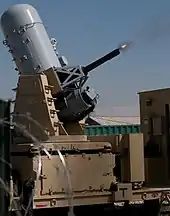 |
20 mm Block 1B Baseline 2 | ||
| Bofors 57 mm gun | .jpg.webp) |
MK 110. A variant of the Bofors 57 mm gun and Gunfire Control System | ||
| OTO Melara Mark 75 | _right_front_view_at_JMSDF_Yokosuka_Naval_Base_November_3%252C_2022_01.jpg.webp) |
76 mm/62 caliber naval gun | ||
Decoys and Countermeasures
| Name | Image | Notes | ||
|---|---|---|---|---|
| Mark 36 SRBOC |  |
chaff countermeasures | ||
| Nulka | 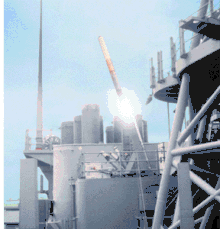 |
MK 53 Mod 10 | ||
Weapons
| Model | Image | Caliber | Type | Origin | Details | |
|---|---|---|---|---|---|---|
| Pistols | ||||||
| P229R-DAK | .jpg.webp) | .40 S&W | Pistol | Former service pistol | ||
| Glock 19 | 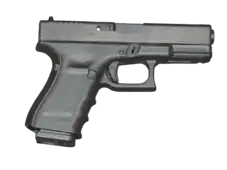 | 9mm | Pistol | Standard service pistol. Replacing the Sig P229R-DAK [33] | ||
| Assault Rifles | ||||||
| M16A2 | 5.56×45mm NATO | Assault rifle | Limited service | |||
| M4 |  | 5.56×45mm NATO | Assault rifle, Carbine | Standard issue service rifle. The Deployable Operations Group also employs the Mk 18 upper receiver[34] | ||
| MK18/CQBR | 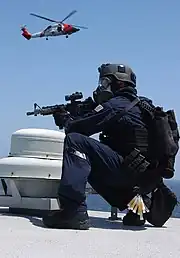 | 5.56×45mm NATO | Assault rifle, Carbine | Standard issue service carbine. The Deployable Specialized Forces also employs them | ||
| Shotguns | ||||||
| M870P | _91106.jpg.webp) | 12-gauge | Shotgun | |||
| Saiga-12 | 12-gauge | Shotgun | The Deployable Specialized Forces employs them | |||
| Machine Guns | ||||||
| M240 | 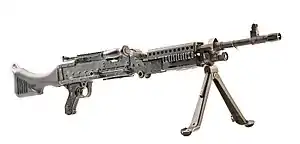 | 7.62×51mm NATO | General purpose, medium machine gun | M240B variant is employed aboard surface vessels while the M240H is used aboard the MH-60 Jayhawk and MH-65 Dolphin helicopters. The M240 is also used on land by Port Security Units[35] | ||
| M249 |  | 5.56×45mm NATO | Light machine gun | Used on various boats and primarily by Deployable Specialized Forces | ||
| M60 |  | 7.62×51mm NATO | General purpose, medium machine gun | Used on various boats such as the Defender-class boat[36] | ||
| Browning M2HB |  | .50 BMG | Heavy machine gun | Primarily mounted on seagoing vessels. Some machine guns are used on land by Port Security Units[37] | ||
| Precision Rifles, Designated Marksman Rifles & Sniper Rifles. | ||||||
| MK14 EBR |  | 7.62×51mm NATO | Designated marksman rifle, Sniper rifle | Variant known as the M14 Tactical fitted with the Mk 14 Enhanced Battle Rifle stock, with a 22-inch barrel and a Smith Enterprise muzzle brake. | ||
| Mk 11 |  | 7.62×51mm NATO | Designated marksman rifle, Sniper rifle | Used by the Deployable Specialized Forces[34] | ||
| Barrett 50 cal/M82/M107 |  | .50 BMG | Anti materiel sniper rifle | Used for Airborne Use of Force (AUF) missions | ||
| Robar RC-50 | .50 BMG | Anti materiel sniper rifle | ||||
| Grenade-Based Weapons | ||||||
| M203 |  | 40mm | Grenade launcher | Single-shot underbarrel grenade launcher[38] | ||
| Mk 19 |  | 40mm | Automatic grenade launcher | Belt-fed | ||
| MK3 grenade | 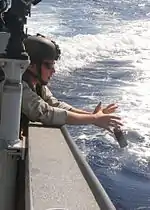 | Concussion Grenade | Used as an anti-swimmer grenade. Being phased out and being replaced by a newer Anti-Swimmer Grenade.[39] | |||
Communications
Coast Guard radio stations cover a wide geographical area using very high frequency and high frequency radios. There are eight major radio stations covering long-range transmissions and an extensive network of VHF radio stations along the nation's coastline and inland rivers.
The current communication system is the Rescue 21. Rescue 21 is an advanced maritime command, control, and communications (C3) system.
The OMEGA navigation system and the LORAN-C transmitters outside the USA were run until 1994 also by the United States Coast Guard, and LORAN-C transmitters within the US were decommissioned in June 2010, with the exception of 5 CONUS LORAN-C stations that continue to be staffed due to international agreements.
See also
References
- ↑ "10". USCG Regulations] (PDF). Archived from the original (PDF) on 2006-07-23. Retrieved 11 December 2006.
- ↑ "Operational_Assets". US Coast Guard. Archived from the original on 16 October 2019. Retrieved 16 October 2019.
- ↑ "United States Coast Guard Regulations, Chapter 10 – Classification and Status of Coast Guard Vessels" (PDF). 1992. COMDINSTM 5000.3B. Archived (PDF) from the original on 3 November 2013. Retrieved 6 August 2013.
- ↑ Ong, Peter (2022-04-21). "USGC's Polar Security Cutters to Receive Mark 38 Mod 4 Guns". Naval News. Retrieved 2022-04-24.
- ↑ "420-foot Icebreaker (WAGB)". Aircraft, Boats, and Cutters: Cutters. 28 June 2013. Archived from the original on 11 January 2010. Retrieved 14 November 2009.
- ↑ "National Security Cutter". United States Coast Guard. Retrieved 20 October 2022.
- ↑ "399-foot Polar Class Icebreakers (WAGB)". Aircraft, Boats, and Cutters: Cutters. 28 June 2013. Archived from the original on 10 January 2010. Retrieved 14 November 2009.
- ↑ "Alaska Lt. Gov. calls for US icebreakers". Fairbanks Daily News-Miner. Associated Press. 30 November 2011. Archived from the original on 20 January 2012.
- ↑ "Northrop Grumman to Supply Polar Ice Breaker Navigation Support for U.S. Coast Guard". 20 October 2013. Archived from the original on 21 October 2013. Retrieved 21 October 2013.
- ↑ Vavasseur, Xavier (2022-07-01). "US Coast Guard Selects Austal USA to Continue OPC Production". Naval News. Archived from the original on 7 July 2022. Retrieved 9 October 2022.
- ↑ Ong, Peter (2022-01-13). "U.S. Coast Guard Provides Information on the Offshore Patrol Cutter". Naval News. Retrieved 2022-01-16.
- ↑ "Our Opinion: Shipbuilding issues should be solved". The Mississippi Press. July 23, 2007. Archived from the original on January 24, 2013. Retrieved 2007-07-23.
- ↑ "Operational Assets". U.S. Coast Guard. Archived from the original on 28 February 2018. Retrieved 8 August 2018.
- ↑ "47-foot Motor Lifeboat".
- ↑ "Keel Laying Ceremony Marks Production of New Response Boat" (Press release). United States Coast Guard. 2007-06-28. Archived from the original on 2007-10-11.
- ↑ "Archived copy". Archived from the original on 2009-10-15. Retrieved 2009-10-15.
{{cite web}}: CS1 maint: archived copy as title (link) - ↑ "Long Range Interceptor".
- ↑ "Transportable Port Security Boat". Archived from the original on 12 December 2012.
- ↑ "Defender-class boat Response Boat". Archived from the original on 5 August 2012.
- ↑ "28 DEFIANT » Metal Shark". Archived from the original on 2013-09-27. Retrieved 2013-09-24.
- ↑ "USCG receives 11th regenerated C-27J". Naval Warfare International. 20 February 2017. Archived from the original on 27 February 2017. Retrieved 26 February 2017.
- ↑ "USCG: C-27J Medium Range Surveillance Aircraft". Archived from the original on 2017-02-27. Retrieved 2017-02-26.
- ↑ Air Forces Monthly. Stamford, Lincolnshire: Key Publishing Ltd. March 2013. p. 31.
- ↑ "EADS North America Delivers 15th HC-144A Ocean Sentry to U.S. Coast Guard". June 7, 2013. Archived from the original on June 14, 2013. Retrieved June 9, 2013.
- ↑ "Airbus Group, Inc. delivers U.S. Coast Guard with its 16th HC-144A Ocean Sentry Aircraft". January 22, 2014. Archived from the original on February 1, 2014. Retrieved January 23, 2014.
- ↑ https://wayback.archive-it.org/all/20090227054603/http://www.uscg.mil/history/webaircraft/C_37A.pdf
- ↑ HH-60J Jayhawk Archived 2013-04-01 at the Wayback Machine at GlobalSecurity.org
- ↑ Read "Leveraging Unmanned Systems for Coast Guard Missions" at NAP.edu. 2020. doi:10.17226/25987. ISBN 978-0-309-68521-4. S2CID 241597106.
- ↑ "Bell Eagle Eye HV-911". USCG. Archived from the original on 2006-08-30. Retrieved 2006-08-25.
- ↑ "US Coast Guard to Launch sUAS Competition". www.uasvision.com. 23 January 2018. Archived from the original on 25 January 2018. Retrieved 24 January 2018.
- ↑ IHS Jane's Land Warfare Platforms Logistics, Support & Unmanned 2015-2016 AM
- ↑ http://militarypd.50webs.com/uscg2.html Archived 2013-04-01 at the Wayback Machine at militarypd.50webs.com
- ↑ https://www.upi.com/Defense-News/2020/09/30/Coast-Guard-fields-new-Glock-pistols/6401601482294/
- 1 2 Joint Service Small Arms Systems Annual Symposium - 20 May 2008
- ↑ "Port Security Unit 305 provides anti-terrorism force protection in Guantanamo Bay, Cuba". coastguard.dodlive.mil. Archived from the original on 26 August 2017. Retrieved 26 August 2017.
- ↑ http://arquivo.pt/wayback/20091015144424/http://www.uscg.mil/acquisition/programs/pdf/rb-sfactsheet.pdf U.S. Coast Guard: Response boat-small fact sheet(PDF)
- ↑ "Everyday heroes tasked with extraordinary duties". www.flickr.com. 22 July 2015. Retrieved 26 August 2017.
- ↑ PA2 John Edwards and PA1 Kimberly Smith, PADET Atlantic City. "Learning to Shoot All Over Again". Coast Guard Magazine, Issue 2, 2006, pp. 4–19.
- ↑ "Anti-Swimmer Grenade offers underwater port security". www.navair.navy.mil. Navair.navy.mil. Retrieved 28 January 2017.
.jpg.webp)
